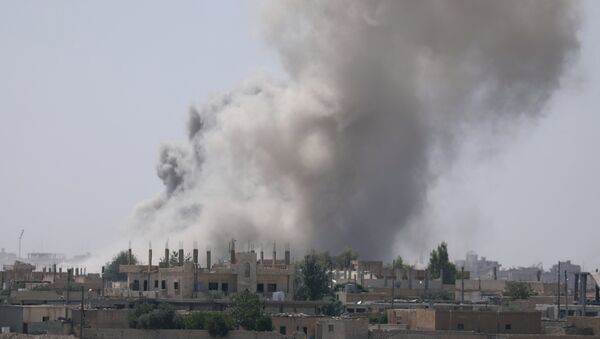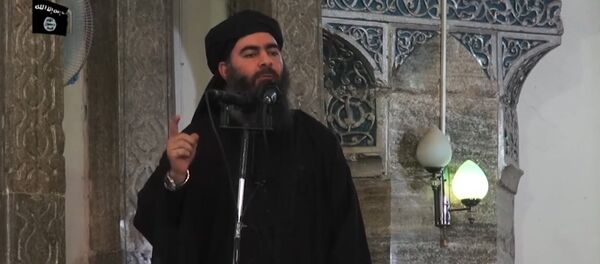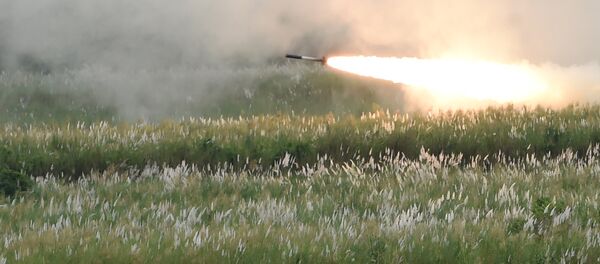Meanwhile, al-Baghdadi’s death has not been confirmed yet. The United States-led coalition in Syria also said it could not confirm the report. Currently, the Russian Defense Ministry is verifying the information.
According to Russian military expert Alexander Zhilin, if the information is confirmed, it will have a decisive effect on the course of the fight against terrorism in Syria.
However, Zhilin said that taking into account the available information, al-Baghdadi is "highly unlikely to have been killed."
"The death of the leader is a serious blow to a militant group. It is impossible to quickly find a replacement and re-arrange the entire command and communications structure within the group. It is very important to take advantage of the current situation," Zhilin told RT.
At the same time, commenting on the report, Russian Foreign Minister Sergei Lavrov stressed that the ramifications of the reported death of the Daesh leader should not be overestimated.
"All examples of such actions on the destruction and 'beheading' of terrorist groups have always been presented with great enthusiasm, however, history shows that the fighting capacity of these structures [terror groups] were then restored," Lavrov said at a news conference Friday.
According to the Russian Defense Ministry, the "military council," during which al-Baghdadi was reportedly killed, was held to discuss an exit plan from Raqqa through the "southern corridor" to Daesh-controlled areas in Syria and Iraq.
Previously, media reported that Daesh leaders fled from Raqqa and Mosul to the city of Mayadin in Deir ez-Zor Province, near the Syrian-Iraqi border.
Nowhere to Run
According to Vyacheslav Matuzov, a Russian political analyst and expert on the Middle East, the Daesh relocation to Mayadin was due to the fact that the terrorists have nowhere to run.
Mayadin is the only major city in the mostly deserted territory that remains under Daesh control.
"If you take a look at the map, it is clear that the terrorists have no other choice. In fact, they’re retreating in disarray," Matuzov told RT.
The Associated Press reported, citing US military sources, that the evacuation of the Daesh leadership to Mayadin began several months ago, when the US-led coalition was advancing on Raqqa.
Claims of the US Coalition’s Support for Militants
Experts note that the actions of the US-led coalition contributed to the fact that many terrorist could easily flee from Raqqa. On May 27, the Israeli analytical and intelligence agency Debka reported that the US-backed Syrian Democratic Forces (SDF) had an agreement with Daesh on a corridor for evacuation from Raqqa.
The Iranian news agency Fars has repeatedly claimed that the US and its allies were coordinating the relocation of militants with Daesh.
Last week, Iranian Armed Forces' Deputy Chief of Staff Mostafa Izadi claimed that Tehran allegedly has evidence proving US "direct support to Daesh."
"As the Supreme Leader of the Islamic Revolution (Ayatollah Seyed Ali Khamenei) said, we possess documents and information showing direct support by US imperialism for this highly disgusting stream [Daesh] in the region, which has destroyed the Islamic countries and created a wave of massacres and clashes," Fars cited Mostafa Izadi as saying.
Washington Still Undecided on Syria
According to Matuzov, the Daesh retreat and the elimination of its commanders is a sign that the terrorist group is in agony.
He underscored that the main question on the agenda is relations between the US coalition and pro-Damascus forces after the defeat of Daesh.
"Whether al-Baghdadi is killed and where Daesh commanders will flee, these are technical matters. The principal issue is whether Russia and the US will be able to find common ground," the expert pointed out.
First, there is the risk of an open military confrontation between the US-backed SDF and the Syrian Army in northern Syria.
Second, Damascus sees the US military presence in Syria as illegitimate. On the other hand, Washington is still undecided on what its approach towards the Syrian government should be.
"The absence of a clear position from the American side is a problem," Matuzov said, adding that during the electoral campaign and after the election Donald Trump and members of his team have several times changed their attitude to Syrian President Bashar Assad.
"Trump has his own stance. State Secretary Rex Tillerson has a different view. There is also the military with their own understanding of the situation," the expert said.





